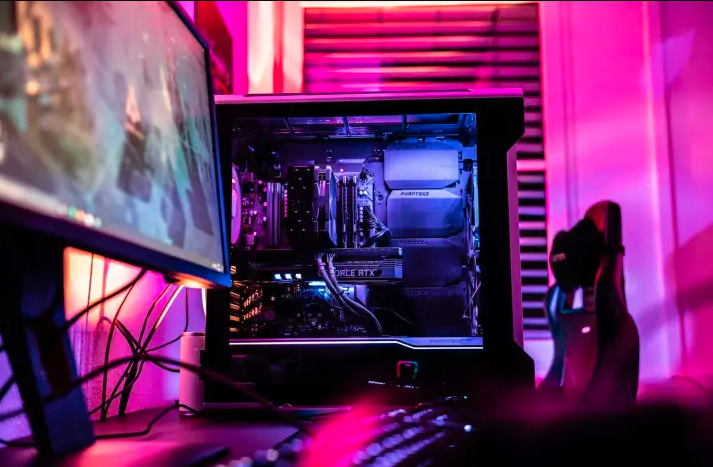Introduction
A suitable PC can make all the difference in the fast-paced gaming world. From immersive graphics to lightning-fast performance, a gaming PC tailored to your needs can elevate your gaming experience. This guide will walk you through the essentials of choosing and setting up a gaming PC, ensuring you get the most out of your gaming adventures.
Understanding Gaming PCs
A gaming PC is designed to handle the high demands of modern games. Unlike standard PCs, gaming PCs have powerful components to support high-resolution graphics, fast frame rates, and smooth gameplay. Here’s a breakdown of what to consider when selecting a gaming PC.
Critical Components of a Gaming PC
-
CPU (Central Processing Unit): The brain of your PC, the CPU handles all the main tasks. A high-performance CPU is essential for smooth gameplay and quick gaming responses. Look for multi-core processors from Intel or AMD.
-
GPU (Graphics Processing Unit): The GPU is crucial for rendering visuals. A powerful GPU ensures that games run at high resolutions and frame rates. NVIDIA and AMD are leading brands in this category.
-
RAM (Random Access Memory): RAM affects how many applications can run simultaneously. 16GB of RAM is typically recommended for gaming, but 32GB can be ideal for high-end setups.
-
Storage: Fast storage solutions like SSDs (Solid State Drives) improve load times and system performance. A combination of SSD and HDD (Hard Disk Drive) can offer both speed and ample storage.
-
Motherboard: This is the main circuit board of your PC, where all components connect. Ensure it is compatible with your CPU and has enough slots for future upgrades.
-
Cooling System: Proper cooling prevents overheating and maintains performance. High-quality air or liquid coolers can help keep your system running smoothly.
-
Power Supply Unit (PSU): A reliable PSU provides power to all components. Choose one with sufficient wattage and good efficiency ratings.
Choosing the Right Gaming PC
When choosing a gaming PC, consider the following factors to ensure you get the best performance.
Budget
Gaming PCs range from budget-friendly options to high-end models. Determine your budget and find the best components within that range. Expect to spend around $1,000 to $1,500 on a mid-range gaming PC.
Purpose
Think about the games you want to play and the level of performance you need. A mid-range PC might suffice for casual gaming, while competitive gamers might need higher-end components for the best experience.
Brand and Model
Research different brands and models to find a PC that offers the best performance, reliability, and price balance. Popular brands include Alienware, ASUS ROG, and MSI.
Setting Up Your Gaming PC
Once you have your gaming PC, proper setup is essential for optimal performance. Here’s how to get started.
Unboxing and Assembling
-
Unbox Carefully: Handle components carefully to avoid damage. Make sure all parts are included.
-
Assemble the PC: Follow the manual to assemble the PC. Ensure the CPU, GPU, RAM, and storage are correctly installed.
-
Connect Peripherals: Attach your monitor, keyboard, mouse, and other peripherals. Ensure all connections are secure.
Installing Software
-
Operating System: Install your preferred operating system, typically Windows, for gaming.
-
Drivers: Update drivers for your GPU, motherboard, and other components to ensure compatibility and performance.
-
Games and Applications: Install your games and any additional gaming software.
Optimizing Performance
-
Adjust Settings: Configure game settings for the best balance of quality and performance.
-
Update BIOS: Keep your motherboard’s BIOS current to ensure compatibility and performance.
-
Monitor Temperatures: Use software to monitor system temperatures and adjust cooling if necessary.
Maintaining Your Gaming PC
Regular maintenance can prolong the life of your gaming PC and ensure it runs efficiently.
Cleaning
-
Dust Removal: Regularly clean dust from your PC’s interior, including fans and filters.
-
Ventilation: Ensure vents are straightforward to maintain proper airflow and cooling.
Software Maintenance
-
Updates: Keep your operating system and drivers up to date.
-
Anti-virus: Use anti-virus software to protect against malware and other threats.
Upgrades
-
RAM and Storage: Consider upgrading RAM or storage if you need more capacity or faster performance.
-
Graphics Card: Upgrade your GPU for better gaming performance as new games and technologies evolve.
Conclusion
Choosing the suitable gaming PC involves:
-
I understand vital components.
-
You are setting up your system correctly.
-
I am maintaining it for long-term performance.
By considering your budget, purpose, and preferred brands, you can find a gaming PC that meets your needs. Proper setup and regular maintenance will ensure your PC delivers the best gaming experience possible. What motivates buyer gaming PC is more than just the desire for a powerful machine.
Investing in a gaming PC is not just about buying hardware; it’s about creating an immersive experience that enhances your gaming adventures. With the proper knowledge and tools, you’ll be well on your way to enjoying your games at their best.
